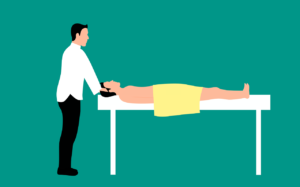
If you’ve ever woken up with a throbbing shoulder, you know how uncomfortable it can be to start your day in pain. Sleeping on your shoulder the wrong way can lead to aches and stiffness that linger throughout the day. Thankfully, there are simple and effective ways to relieve shoulder pain after sleeping on it. By practicing a few stretches and making minor adjustments to your sleeping position, you can wake up refreshed and pain-free. In this article, we’ll explore these helpful techniques and provide you with the tools you need to enjoy a restful night’s sleep without shoulder discomfort.
How to Relieve Shoulder Pain After Sleeping on It

Understanding the Causes of Shoulder Pain
Shoulder pain after sleeping on it can be caused by various factors. One common cause is sleeping in an uncomfortable position that puts excess pressure on your shoulder joint. This can lead to stiffness, soreness, and even muscle tension. Another cause could be an underlying shoulder injury or condition, such as tendinitis or bursitis, which can be exacerbated by sleeping in an awkward position. Understanding the specific cause of your shoulder pain is crucial in finding the right solutions to relieve it.
Preventing Shoulder Pain While Sleeping
Prevention is always better than cure, and the same applies to shoulder pain caused by sleeping on it. To prevent shoulder pain, it is important to establish good sleep habits and create a comfortable sleep environment. Start by investing in a quality mattress and pillows that provide adequate support to your entire body, including your shoulders. Additionally, try to maintain a consistent sleep schedule, avoid caffeine and excessive alcohol intake before bed, and create a calm and relaxing atmosphere in your bedroom.

Choosing the Right Sleeping Position
The sleeping position you choose greatly impacts the well-being of your shoulders. The best sleeping position to relieve shoulder pain is on your back, as it distributes your body weight evenly and keeps your shoulders in a neutral position. If you prefer to sleep on your side, make sure to use a pillow that is thick enough to align your neck and spine properly, while also providing support to your shoulder. Avoid sleeping on your stomach, as this can strain your shoulders and exacerbate any existing pain.
Using Supportive Pillows
Supportive pillows play a vital role in relieving shoulder pain after sleeping on it. When selecting a pillow, opt for one that is firm, yet comfortable, and that provides proper support to your neck and shoulders. Memory foam pillows are often recommended, as they contour to the shape of your neck and offer excellent support. Additionally, consider using a small pillow or rolled-up towel to support your shoulder and keep it in a neutral position while you sleep. Experiment with different pillow arrangements until you find the one that provides the most relief.

Incorporating Stretching and Exercises
Regular stretching and exercises specifically targeting the shoulder area can help alleviate pain and prevent future discomfort. Gentle stretching exercises, such as shoulder rolls, arm circles, and doorway stretches, can increase flexibility and reduce stiffness in the shoulder joint. Strengthening exercises, such as shoulder presses and lateral raises, can also help improve shoulder stability and reduce pain. However, it is important to consult with a physical therapist or healthcare professional before starting any new exercise routine, especially if you have a pre-existing shoulder condition.
Applying Heat or Cold Therapy
Heat and cold therapy are effective methods for relieving shoulder pain after sleeping on it. Applying a heating pad or a hot water bottle to the affected area can help relax the muscles and increase blood flow, promoting healing and reducing pain. On the other hand, cold therapy, such as using an ice pack or a frozen gel pack, can help reduce inflammation and numb the area, providing temporary pain relief. It is important to use these therapies cautiously and avoid applying heat or cold directly to the skin. Wrap the hot or cold pack in a towel before applying it to your shoulder.
Using Over-the-Counter Pain Relievers
Over-the-counter pain relievers can provide temporary relief from shoulder pain after sleeping on it. Non-steroidal anti-inflammatory drugs (NSAIDs), such as ibuprofen or naproxen, can help reduce inflammation and alleviate pain. Follow the instructions on the packaging and consult with a pharmacist or doctor if you have any concerns or pre-existing medical conditions. Remember to use these medications sparingly and only as directed, as long-term or excessive use can have adverse effects on your health.
Trying Natural Remedies
In addition to medication and other conventional methods, there are various natural remedies that can help relieve shoulder pain. Some people find relief by using essential oils, such as lavender or peppermint oil, which have soothing properties and can be massaged onto the affected area. Others find benefit from herbal remedies like arnica or chamomile, which can be applied topically as creams or ointments. However, it is important to note that natural remedies may not work for everyone, and individual results may vary. Consult with a healthcare professional before trying any new natural remedies.
Seeking Professional Help
If your shoulder pain persists or worsens after trying various home remedies, it may be time to seek professional help. A healthcare professional, such as a doctor or physical therapist, can assess your condition, identify the underlying cause of your shoulder pain, and recommend appropriate treatment options. They may recommend specialized therapies, such as manual therapy, ultrasound, or transcutaneous electrical nerve stimulation (TENS) to alleviate pain and promote healing. In some cases, they may refer you to a specialist for further evaluation or intervention.
Creating a Comfortable Sleep Environment
Lastly, creating a comfortable sleep environment is essential for preventing and relieving shoulder pain after sleeping on it. Make sure your bedroom is cool, quiet, and free from distractions that may disrupt your sleep. Use blackout curtains or eye masks to block out any unwanted light, and consider investing in a white noise machine or earplugs to drown out any noise that may disturb your sleep. Additionally, maintain good sleep hygiene by avoiding electronics before bed and engaging in relaxing activities, such as reading or practicing deep breathing exercises to unwind and prepare your body for sleep.
In conclusion, relieving shoulder pain after sleeping on it involves understanding the causes, taking preventative measures, choosing the right sleeping position, using supportive pillows, incorporating stretching and exercises, applying heat or cold therapy, considering over-the-counter pain relievers or natural remedies, seeking professional help if necessary, and creating a comfortable sleep environment. By implementing these strategies, you can minimize discomfort, promote healing, and enjoy a restful night’s sleep without shoulder pain.







